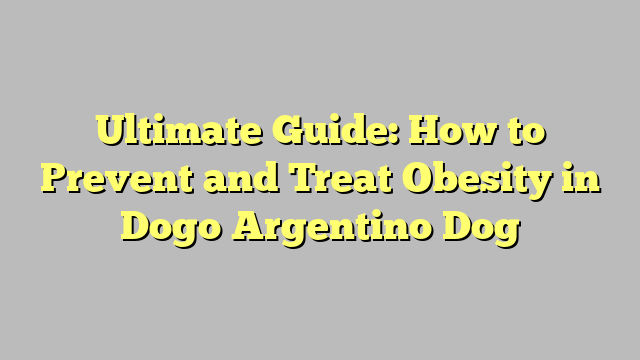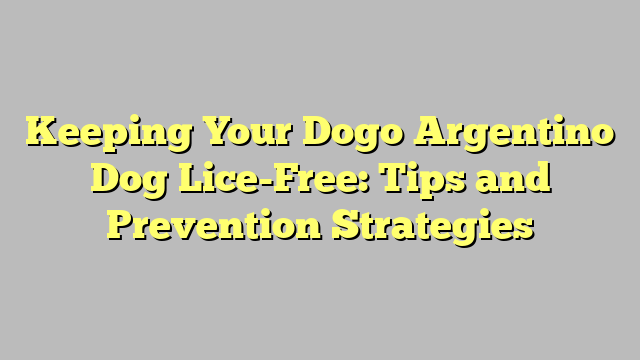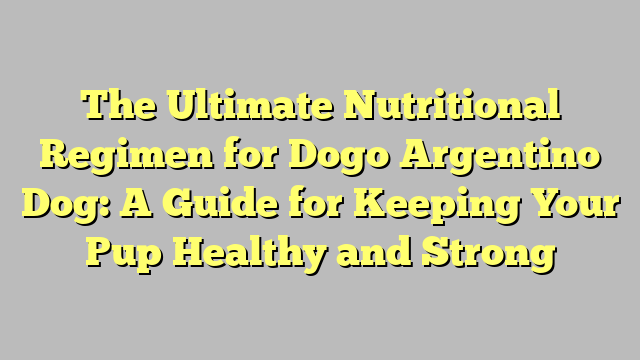
Ultimate Guide: How to Prevent and Treat Obesity in Dogo Argentino Dog
Discover the ultimate guide on preventing and treating obesity in Dogo Argentino Dog. Learn key strategies to keep your beloved pet healthy and happy.
Understanding Obesity in Dogo Argentino Dog
Obesity is a common problem in Dogo Argentino Dog, and it can have serious health implications for your pet. Just like humans, obesity in dogs can lead to a range of health issues, including diabetes, heart disease, and joint problems. It’s important to understand the causes of obesity in Dogo Argentino Dog and how to prevent and treat it.
Causes of Obesity in Dogo Argentino Dog
There are several factors that can contribute to obesity in Dogo Argentino Dog. Overfeeding and lack of exercise are the most common causes. Many owners may not realize that they are overfeeding their dogs or not providing enough opportunities for exercise. Additionally, certain medical conditions or medications can also lead to weight gain in dogs.
Preventing and Treating Obesity
Preventing obesity in Dogo Argentino Dog involves providing a balanced diet and regular exercise. It’s important to feed your dog the appropriate amount of food for their age, size, and activity level. Additionally, regular exercise, such as daily walks and playtime, is essential for maintaining a healthy weight. If your dog is already overweight, it’s important to work with your veterinarian to develop a weight loss plan that includes a balanced diet and increased physical activity.
List:
– Monitor your dog’s food intake and avoid overfeeding
– Provide regular exercise and playtime
– Consult with your veterinarian for a weight loss plan tailored to your dog’s needs
By understanding the causes of obesity in Dogo Argentino Dog and taking proactive steps to prevent and treat it, you can help your pet live a healthier and happier life. Remember, always consult with your veterinarian for personalized advice and guidance on your dog’s specific needs.
Preventing Obesity in Dogo Argentino Dog
Obesity can be a serious health issue for Dogo Argentino Dog, leading to a range of health problems such as joint issues, heart disease, and diabetes. It is important for owners to take proactive steps to prevent obesity in their pets.
Proper Diet
One of the most important factors in preventing obesity in Dogo Argentino Dog is ensuring they are on a proper diet. This means feeding them high-quality, nutritious food that is appropriate for their age and activity level. Avoid feeding them too many treats or table scraps, as these can contribute to weight gain.
Regular Exercise
Regular exercise is crucial for keeping Dogo Argentino Dog at a healthy weight. Daily walks, playtime, and other forms of physical activity are essential for preventing obesity and keeping them fit and healthy.
Monitor Food Intake
It’s important to monitor your dog’s food intake and adjust their portions as needed. Be mindful of their calorie intake and make adjustments based on their activity level and any changes in weight. This can help prevent overfeeding and weight gain.
Regular Veterinary Check-ups
Regular veterinary check-ups are important for monitoring your dog’s weight and overall health. Your vet can provide guidance on proper nutrition, exercise, and weight management for your Dogo Argentino Dog.
Avoid Overfeeding
Avoid overfeeding your dog, as this can lead to obesity. Stick to recommended portion sizes and avoid giving in to begging behavior, as this can lead to overeating.
By following these tips and being mindful of your Dogo Argentino Dog’s diet and exercise, you can help prevent obesity and keep them healthy and happy.
Treating Obesity in Dogo Argentino Dog
Obesity is a common issue in Dogo Argentino Dog, and it can lead to a variety of health problems such as joint pain, diabetes, and heart disease. To address this issue, it’s important to focus on both diet and exercise.
Diet
– Consult with your veterinarian to determine the appropriate amount of food for your dog based on their age, weight, and activity level.
– Choose a high-quality, grain-free dog food with a protein as the first ingredient and minimal fillers.
– Avoid feeding table scraps and high-calorie treats, and instead opt for healthy snacks such as raw uncut, uncooked green beans or plain yogurt.
– Consider adding supplements of omega-3 fatty acids to help with weight management and overall health.
Exercise
– Regular exercise is crucial for maintaining a healthy weight in Dogo Argentino Dog. Aim for at least 30 minutes of physical activity each day, such as brisk walks or active playtime.
– Engage in interactive activities with your dog, such as fetch or agility training, to keep them mentally and physically stimulated.
– Monitor your dog’s activity level and adjust their exercise routine as needed to prevent boredom or overexertion.
It’s important to work closely with your veterinarian to develop a comprehensive weight management plan for your Dogo Argentino Dog. By focusing on a balanced diet and regular exercise, you can help your dog achieve and maintain a healthy weight, leading to a longer and happier life.
Nutritional Considerations for Dogo Argentino Dog
Dietary Requirements
Dogo Argentino Dog require a high-quality diet that is grain-free and free from fillers. The first ingredient in their food should be a high-quality protein such as chicken, beef, fish, bison, lamb, or turkey. It is important to avoid ingredients such as corn, corn meal, or other grains, as well as preservatives. Additionally, the diet should contain a variety of vegetables, vitamins, and minerals to ensure a balanced nutritional intake.
Supplementation
Supplementation of omega-3 fatty acids is highly recommended for Dogo Argentino Dog to support their skin and joint health. This can be achieved by adding generic fish oil capsules and vitamin E capsules to their daily food. In addition, probiotics such as plain yogurt (sugar-free) and cottage cheese can be beneficial for their digestive health. Eggs can also be added to provide extra protein, while canned pumpkin and raw, uncooked green beans can provide extra fiber for dogs with colitis without adding unnecessary calories.
Life Stage-Specific Nutrition
It is important to feed puppies a puppy-specific diet, adult dogs an adult-specific diet, and pregnant bitches a puppy-specific diet until they are weaned. This ensures that their nutritional needs are met at each stage of life. Additionally, high-quality diets should be supplemented with omega-3 fatty acids to support the overall health and well-being of Dogo Argentino Dog.
Exercise and Activity Recommendations for Dogo Argentino Dog
Regular exercise is essential for the health and well-being of Dogo Argentino Dog. These dogs are strong and muscular, and they require daily exercise to keep them physically and mentally stimulated. A minimum of 30-60 minutes of moderate to intense exercise per day is recommended for this breed. This can include brisk walks, jogging, hiking, or engaging in interactive play such as fetch or agility training.
Outdoor Activities
– Daily walks: Take your Dogo Argentino Dog for at least two 30-minute walks each day to ensure they get enough physical activity.
– Running: Allow your dog to run in a secure, fenced-in area to burn off excess energy and maintain muscle tone.
– Hiking: Take your dog on hikes in nature to provide mental stimulation and engage their senses.
Indoor Activities
– Interactive play: Engage in games such as tug-of-war, hide and seek, or puzzle toys to keep your dog mentally stimulated.
– Obedience training: Use indoor training sessions to reinforce commands and provide mental exercise for your dog.
– Indoor fetch: Play fetch in a large, open indoor space to keep your dog active during inclement weather.
Regular physical activity is crucial for maintaining the health and happiness of Dogo Argentino Dog. It is important to tailor the exercise routine to your dog’s individual needs and abilities, and always consult with a veterinarian before starting a new exercise regimen.
In conclusion, preventing and treating obesity in Dogo Argentino Dog requires a balanced diet, regular exercise, and monitoring of their weight. Consult with a veterinarian to create a tailored plan for your dog’s specific needs. With the right approach, obesity can be managed effectively in this breed.





